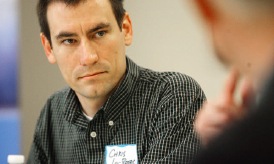Clergy say look to story of Good Samaritan for example of how to treat immigrants, others.
By Kelly Corbett, Goldsboro News-Argus

Immigration is not just a political issue — it is about life and death, an advocate who works with churches told Wayne County clergy Tuesday. Chris Liu-Beers, program associate with the North Carolina Council of Churches, met with 17 local religious leaders during a special breakfast designed to encourage conversations about the topic and how churches can play a role.
One of those sharing his experiences with the immigrant community was the Rev. John Richardson, a regional minister with the Christian Church, Disciples of Christ. He equated the immigration issue to the story of the Good Samaritan in the Bible.
“It’s a wonderful Sunday school story,” Richardson said. “It’s a wonderful story for children’s moments. It’s a great story until we’re confronted with us being the person that has to go take care of the individual in the ditch and everybody else — all the other leaders in our culture and in the church — can walk by. And probably it’s still not a problem as long as that person in the ditch looks like us and talks like us.”
With tears in his eyes, Richardson then told the stories of two children who came looking for their parents in America, including one girl who died of thirst in an Arizona desert. “Why shouldn’t they come here? If they have no food and we have food thrown away every day, good food thrown away, why should they not come?” Richardson asked.
It was not until the end of the one-and-a-half hour clergy breakfast that the topic of the Arizona immigration law was briefly discussed. Samuel Leon, a leader at Voz De Dios of Gardner, who was born in Mexico and moved to the U.S. in 1990, asked if it would be politically correct for churches to get involved in protests if a law similar to the Arizona immigration law comes to North Carolina.
Richardson said he is confident the state Council of Churches would oppose such a law, and Liu-Beers added that it is a real possibility such a law will be voted on since similar laws have been passed in other Southern states after the Arizona immigration law was passed two years ago.
After the meeting, Liu-Beers said it is unclear what protections, if any, church leaders have concerning their interactions with undocumented immigrants under state law. Church leaders are often on the forefront of immigration, he said, because immigrants often seek places to worship when they come into a new area, sometimes as a place of refuge. That uncertainty is what creates fear and hostility in the otherwise commonly hospitable atmosphere within churches, he said.
Liu-Beers said North Carolinians need to start looking more into the topic and talking about it because the conversation is what matters. “I think too often we kind of skip over these stories,” Liu-Beers said. After the gathering Tuesday, several pastors and others stayed around to talk about the issue and how their congregations could get involved.
The immigration issue is particularly pertinent at First Baptist Church, where the breakfast was held and where Hispanic and Haitian services have begun over the past few years due to an influx of immigrants.
Pastor Dennis Atwood said the church “stumbled into” the other ministries, especially when a couple dozen Haitians appeared at one of the congregation’s traditional church services in September 2010. “It’s really a strange, wonderful mixture that we’ve got going,” Atwood said. He said back when he was in seminary he did not learn about how to deal with immigrant ministries, so this is and has been a learning experience for him.
“The question that I’m always asked is not, ‘Should we do something?’ The question is, ‘What do we do and how do we go about it?’” Atwood said. He said he is ready to develop more formal partnerships, and that the church is currently working to find a more roomy location for Haitians to worship in Mount Olive.
“If you really peel the onion back a little bit and start looking at the ethnicity, the race issues, the immigration issues, the infrastructure of the communities, schools, how everything is affected. … Immigration is such a hot issue in our country right now politically. How do we handle it as a church, I think, is crucial,” Atwood said.
He and some of the other leaders said they hope to meet again with Liu-Beers to discuss the topic in more depth, and might also hold workshops.
Those at First Baptist Church are more involved than just giving Hispanics and Haitians in Mount Olive a place to worship, he said. They also help provide a community atmosphere along with food and other necessities for the newcomers.
“How do I love my neighbor?” is the seemingly simple question at hand, Atwood said.
Kitty Bass, member of Outlaw’s Bridge Universality Church, said working at Goshen Medical Center for eight years she heard several firsthand accounts of people who came to America by traveling across the desert, swimming the river or climbing over the mountains — some looking for food and others escaping the series of rapes in Ciudad Juarez, Mexico.
“I heard the stories of families who would come in completely broken, who work at Butterball, and telling that that day when they left their child they were aware that that might be the last time they would see that child. And the story of people who had had no food, who had never slept on a bed, and as I listened to this, this is right here. It isn’t in Arizona or somewhere else.”
